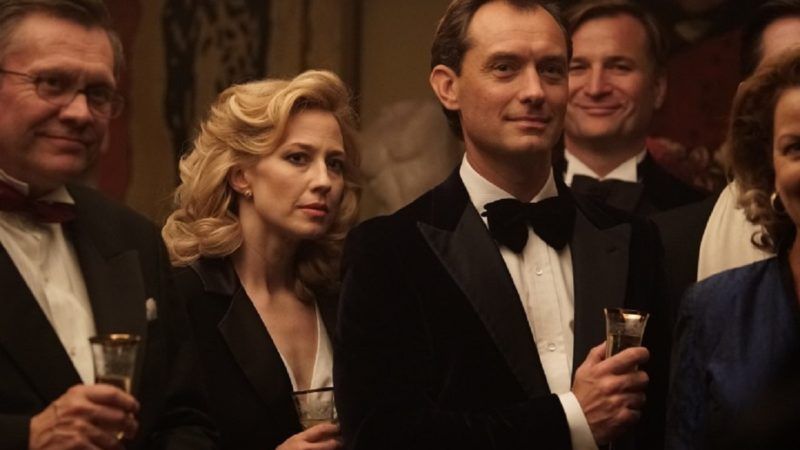Reviews: The Nest and No Escape
Jude Law and Carrie Coon in top form, and a little bit of torture porn lite.

After 27 years of memorable work in films by Steven Spielberg, Martin Scorsese and Wong Kar-Wai, among many others, Jude Law can still surprise us. In The Nest, he gives one of the strongest performances of his career, playing a man whose life has evolved into a shaky edifice of lies, too many of which he has come to believe himself. Law brings a subtle emotional charge to the picture without unbalancing its carefully controlled tempo, and he's wonderfully well-supported by his costar, the brilliant Carrie Coon (The Leftovers).
The Nest is writer-director Sean Durkin's first movie since his well-regarded 2011 film Martha Marcy May Marlene (he's spent most of his time since then producing). The story is set in the mid-1980s. Rory O'Hara (Law) is an expatriate English stock trader now working on Wall Street, and his wife Allison (Coon), an American, is raising their two children, Samantha (Oona Roche) and Benjamin (Charlie Shotwell), on a large, leafy estate. They are prosperous exurbanites—Allison teaches horse riding to well-off local kids—but not prosperous enough for Rory: He wants to uproot the family and return to his native London to take a new job that he says has been offered to him by his old employer, the avuncular Arthur Davis (Michael Culkin).
As is usually the case with Rory's plans, everything is not what it seems. Arthur didn't call Rory and invite him back—Rory called Arthur to ask for the job. And the job isn't really what Rory is interested in. He's actually scheming to help another company buy out Arthur's operation and turn it into a global powerhouse —at great financial benefit to Rory, of course.
The relocation to England is agreeably compressed: After the introductory New York scenes, we simply see the family trying to settle into their new home—a way-too-big manor in the Sussex countryside, which Rory has rented for an amount of money he'd rather not discuss. Before long, Allison realizes that their bank account is running dry. Then their telephone service is turned off. Rory keeps bobbing and weaving—there's "a huge check coming," he says. But it never materializes.
The story proceeds in a succession of rich scenes: an awkward visit to Rory's semi-estranged mother (Anne Reid), a gruesome episode with a dead horse, a heartbroken taxi ride (peak Jude Law), and a dinner party that careens completely off the rails when Allison publicly runs out of patience with her husband. ("You're so full of shit," she tells him.)
Through all of this, we can see the slow death of Allison's feelings for her husband passing wordlessly across Coons' face. It's a riveting performance, especially when Allison takes in yet another of Rory's latest brainstorms and delivers the judgment of terminally fed-up spouses throughout the ages. "You're exhausting," she tells him.
No Escape
No Escape has the hunched and gasping air of an old-school torture-porn movie (it much resembles Eli Roth's Hostel films). But there's no torture! Or rather, there is torture, but you mostly don't see it—somebody's always standing in the way when an ear gets lopped off, or an arm gets severed. There's some very claustrophobic tension, and a good bit of glopping around in the guts of a fresh corpse, but generally, this movie is torture lite.
Like Videodrome, another picture it resembles, No Escape has something to say about modern media—although not enough to amount to a message, really. The protagonist is a hyper-successful vlogger named Cole (Keegan Allen, of Pretty Little Liars). Cole has spent 10 years traveling the world in search of photogenic kicks and he's built an audience of millions for his web series ERL ("Escape Real Life"). Now, he and his team—three co-adventurers plus Cole's girlfriend, Erin (Holland Roden, of Teen Wolf)—are flying first-class to Moscow, where a wealthy fan named Alexei (Ronen Rubenstein) has devised an evening of extreme thrills for them. (Alexei is said to be "next-level loaded," and he's the object of the movie's funniest line: "This guy is so rich that everything he does is legitimately the best.")
The venue for Alexei's big night out is an abandoned prison (or something), furnished with all the familiar horrors: an Iron Maiden, an electric chair, a rack, and a Houdini-style glass cabinet with water hose hooked up. Naturally, there are also tables filled with torture implements and gore-slicked goons hulking about in black leather butcher aprons. Once each of his companions has been situated in one of the torture devices, Cole is given one hour to free them all—while a world-wide audience of freaks and troglodytes giggles along under their rocks.
Cole's mission is exceedingly difficult, as you might imagine, but—spoiler—not impossible. Writer-director Will Wernick—whose last movie was simply called Escape Room—keeps the nonsense moving along, and thanks to cinematographer Jason Goodell, the movie looks a lot better than it needed to. The switcheroo ending, however, is not something that Eli Roth would've signed off on.
